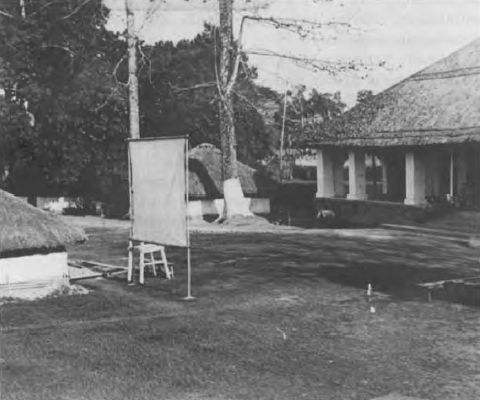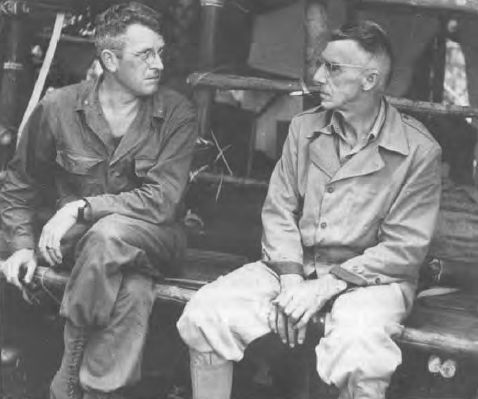Detachment 101 on:
[Wikipedia]
[Google]
[Amazon]





 Detachment 101 of the
Detachment 101 of the
here
Actually, the medal was the result of a mistake. An OSS officer, reading a radio message that advised him how to reward heroic Kachin action, misinterpreted the abbreviation for "comma" ("CMA") as signifying some sort of a medal. Reluctant to leave the Kachins empty handed, the OSS quickly created the medal and presented it to them.Hughes, Les
Retrieved 2 June 2012
OSS 101 Association
Groups of World War II Military units and formations of the United States Army in World War II Military units and formations in Burma in World War II History of Myanmar





 Detachment 101 of the
Detachment 101 of the Office of Strategic Services
The Office of Strategic Services (OSS) was the intelligence agency of the United States during World War II. The OSS was formed as an agency of the Joint Chiefs of Staff (JCS) to coordinate espionage activities behind enemy lines for all bran ...
(formed under the Office of the Coordinator of Information
The Office of the Coordinator of Information was an intelligence and propaganda agency of the United States Government, founded on July 11, 1941, by President Franklin D. Roosevelt, prior to U.S. involvement in the Second World War. It was intende ...
just weeks before it evolved into the OSS) operated in the China-Burma-India Theater of World War II. On 17 January 1956, it was awarded a Presidential Distinguished Unit Citation by President Dwight Eisenhower, who wrote: "The courage and fighting spirit displayed by its officers and men in offensive action against overwhelming enemy strength reflect the highest tradition of the armed forces of the United States."
History
"On April 14, 1942, William Donovan, as Coordinator of Information (which evolved into theOffice of Strategic Services
The Office of Strategic Services (OSS) was the intelligence agency of the United States during World War II. The OSS was formed as an agency of the Joint Chiefs of Staff (JCS) to coordinate espionage activities behind enemy lines for all bran ...
that June), activated Detachment 101 for action behind enemy lines in Burma
Myanmar, ; UK pronunciations: US pronunciations incl. . Note: Wikipedia's IPA conventions require indicating /r/ even in British English although only some British English speakers pronounce r at the end of syllables. As John Wells explai ...
. The first unit of its kind, the Detachment was charged with gathering intelligence, harassing the Japanese through guerrilla actions, identifying targets for the Army Air Force to bomb, and rescuing downed Allied airmen. Because Detachment 101 was never larger than a few hundred Americans, it relied on support from various tribal groups in Burma. In particular, the vigorously anti-Japanese Kachin people
The Kachin peoples ( Jingpo: ''Ga Hkyeng'', ; , ), more precisely the Kachin Wunpong (Jingpo: ''Jinghpaw Wunpawng'', "The Kachin Confederation") or simply Wunpong ("The Confederation"), are a confederation of ethnic groups who inhabit the Kachin ...
were vital to the unit's success. By the time of its deactivation on July 12, 1945, Detachment 101 had scored impressive results. According to official statistics, with a loss of some 22 Americans, Detachment 101 killed 5,428 Japanese and rescued 574 Allied personnel." 101's efforts opened the way for Stilwell's Chinese forces, Wingate's Raiders, Merrill's Marauders
Merrill’s Marauders (named after Frank Merrill) or Unit ''Galahad'', officially named the 5307th Composite Unit (Provisional), was a United States Army long range penetration special operations jungle warfare unit, which fought in the South ...
, and the great counter-attack against the Japanese Imperial life-line."
During most of the unit's existence, it funded and coordinated various resistance groups made up of the Kachin people of northern Burma. The best known resistance force was known as the Kachin Rangers and was under the command of Carl F. Eifler, though often the term Kachin Rangers has been used to describe all Kachin Forces raised during the war by the Americans in Northern Burma.
In July 1942, twenty OSS men moved in and set up headquarters at Nazira in the northeastern Indian province of Assam
Assam (; ) is a state in northeastern India, south of the eastern Himalayas along the Brahmaputra and Barak River valleys. Assam covers an area of . The state is bordered by Bhutan and Arunachal Pradesh to the north; Nagaland and Manipur t ...
. No operations of any significance occurred until the end of 1942. Starting in 1943, small groups or individuals were parachuted behind Japanese lines to remote Kachin villages, followed by a parachute supply drop. The Americans then began to create independent guerrilla groups of the Kachin people, calling in weapons and equipment drops. In December 1943 Stilwell issued a directive that Detachment 101 increase its strength to 3,000 guerillas. They were recruited from within Burma, many of them "fierce Kachins".
Once established, the groups undertook a variety of unconventional missions. They ambushed Japanese patrols, rescued downed American pilots, and cleared small landing strips in the jungle. They also screened the advances of larger Allied forces, including Merrill's Marauders
Merrill’s Marauders (named after Frank Merrill) or Unit ''Galahad'', officially named the 5307th Composite Unit (Provisional), was a United States Army long range penetration special operations jungle warfare unit, which fought in the South ...
.
Eifler held the rank of Colonel
Colonel (abbreviated as Col., Col or COL) is a senior military officer rank used in many countries. It is also used in some police forces and paramilitary organizations.
In the 17th, 18th and 19th centuries, a colonel was typically in charge of ...
when he was relieved because of serious head injuries, Lt. Col. William R. Peers
William Ray Peers (June 14, 1914 – April 6, 1984) was a United States Army general, who is most notable for presiding over the Peers Commission investigation into the My Lai massacre and other similar war crimes during the Vietnam War.
Bio ...
taking over command. At the end of the war, each Kachin Ranger received the CMA (Citation for Military Assistance) Award.Rangers were given a "Certificate of Military Assistance" and a medal known as a "Citation for Military Assistance." An illustration of an actual certificate and medal presented to a Kachin Ranger may be viewehere
Actually, the medal was the result of a mistake. An OSS officer, reading a radio message that advised him how to reward heroic Kachin action, misinterpreted the abbreviation for "comma" ("CMA") as signifying some sort of a medal. Reluctant to leave the Kachins empty handed, the OSS quickly created the medal and presented it to them.Hughes, Les
Retrieved 2 June 2012
See also
*Ledo Road
The Ledo Road (from Ledo, Assam, India to Kunming, Yunnan, China) was an overland connection between India and China, built during World War II to enable the Western Allies to deliver supplies to China and aid the war effort against Japan ...
* Force 136
Force 136 was a far eastern branch of the British World War II intelligence organisation, the Special Operations Executive (SOE). Originally set up in 1941 as the India Mission with the cover name of GSI(k), it absorbed what was left of SOE's O ...
* Fort Hertz
Fort Hertz was a remote British Military outpost in northeastern Burma in the district of Putao in what is now the Kachin State near the present town of Putao. It was named after William Axel Hertz. Hertz led the first expeditions into the fa ...
*''Behind the Burma Road
''Behind the Burma Road'' is a 1963 book by William R. Peers and Dean Brelis that describes the American guerrilla warfare operations, including those of OSS Detachment 101, during the Burma Campaign in the China Burma India Theater during Wor ...
''
* Burma campaign
Notes
References
Further reading
* * * *{{cite book , title=Behind Japanese Lines: With the OSS in Burma , url=https://archive.org/details/behindjapaneseli00dunl , url-access=registration , first=Richard , last=Dunlop , year=1979 , isbn=0-528-81823-6 * Peers, William R. andDean Brelis
Dean Brelis (April 1, 1924 – November 17, 2006) was a journalist who worked as a foreign correspondent for NBC, CBS and Time magazine and wrote novels and nonfiction books. He was born Constantinos Christos Brelis in Newport, Rhode Island to G ...
(1963). ''Behind the Burma Road
''Behind the Burma Road'' is a 1963 book by William R. Peers and Dean Brelis that describes the American guerrilla warfare operations, including those of OSS Detachment 101, during the Burma Campaign in the China Burma India Theater during Wor ...
''. Boston: Little, Brown & Co.
*Central Intelligence Agency. ''Intelligence Operations of OSS Detachment 101.'' Retrieved 2012-05-28.
*Central Intelligence Agency. ''Behind Japanese Lines in Burma: The Stuff of Intelligence Legend (2001).'' Retrieved 2012-05-30.
External links
OSS 101 Association
Groups of World War II Military units and formations of the United States Army in World War II Military units and formations in Burma in World War II History of Myanmar